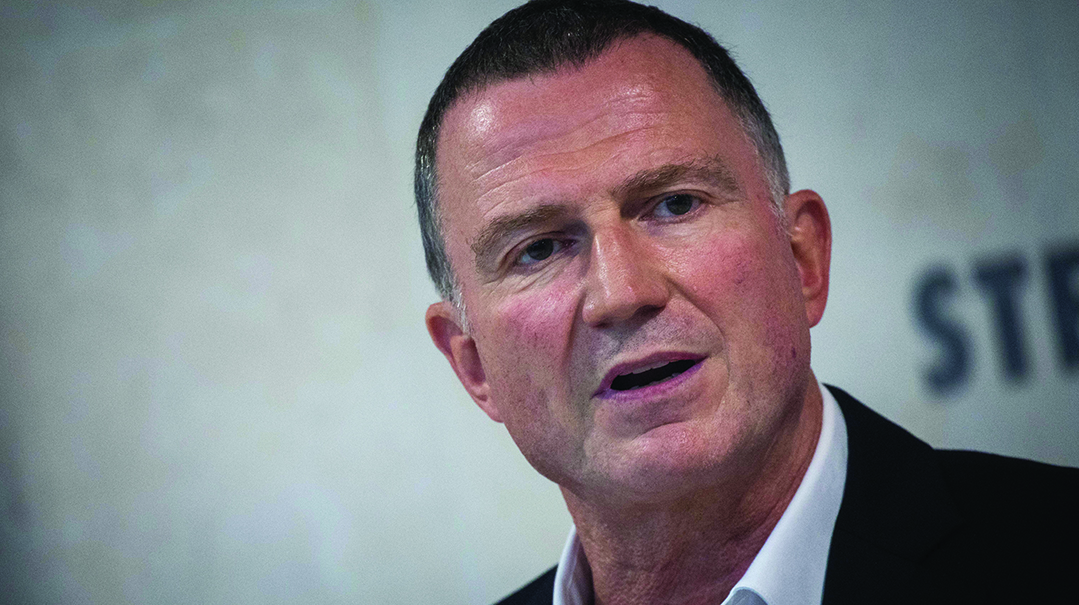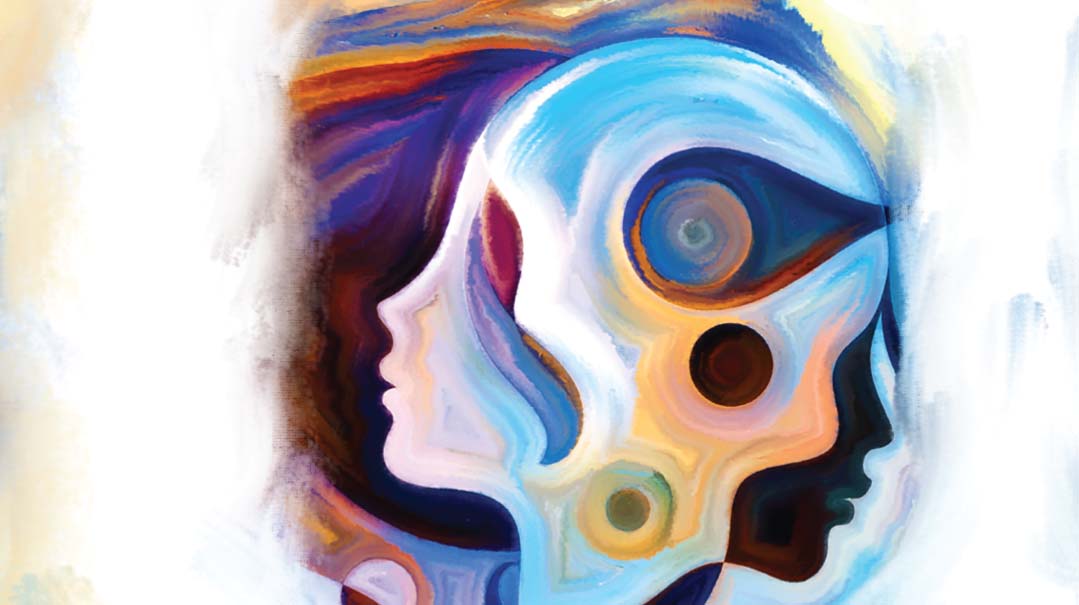Face to Face with Israel’s Health Minister Yuli Edelstein

"The mainstream understands the danger. But sadly there are a few ‘heroes’ who refuse to obey the call of gedolim to follow regulations, with grave results”

Photos: Flash 90
Yuli Edelstein took the helm of Israel’s Health Ministry in May 2020, just as the first wave of coronavirus was ebbing. He stepped into the role after resigning as Knesset speaker, a position he’d held for seven years. He is used to fighting impossible battles; before grappling with a global pandemic or chairing the plenum in Israel’s unruly parliament, he was one of the most prominent Jewish refuseniks in the Soviet Union.
In the middle of Israel’s third wave, he sat down with Mishpacha and faced some tough questions about the country’s pandemic prognosis, and offered some predictions about the political arena as the party lists closed for the fourth elections in two years.
He is not one to offer platitudes, as was clear in a recent speech he delivered in the Knesset about the hoped-for victory against corona.
“One final effort? That’s not where the situation is,” he said, warning against deceptive promises of a swift end to the crisis. “There’s a feeling in the air that ‘one final effort and it’s behind us.’ It has to be said honestly — we’ll be living in the shadow of the coronavirus for a long time. I haven’t learned to lie even in politics, and I’m not going to tell you ‘in a month everything will reopen and life will go back to normal.’ We’ll have to be very cautious in exiting this lockdown.”
As we begin our interview, I remind him of his words in the Knesset.
It sounds like maybe you regret accepting the job of health minister.
“Not at all. HaKadosh Baruch Hu gave me the opportunity to do great things for Am Yisrael. It’s a huge challenge, but I’m very happy with it. I feel like my political experience is serving me in good stead as we handle what is possibly the greatest crisis ever faced by the State of Israel. It’s helping me do something impactful, save lives.”
Israel has been in a tough lockdown for a month now and it doesn’t seem to be having an effect. Any thoughts?
“It’s true that in hospitals the situation is very bad. In fact, it hasn’t been this bad since the beginning of the crisis. We’re talking about more than 1,100 severe cases in the corona wards. But to exit the lockdown under these circumstances is irresponsible — it would lead to an infection rate we simply can’t handle. According to the experts, if not for the current lockdown, we would be at 30,000 cases per day and 3,000 serious cases. The lockdown is much less effective than we could wish for, but without it, the health system would collapse.”
Can you explain what’s happening here? Over 3 million Israelis have already received the first dose of the corona vaccine. But the infection rate remains high, and we’re seeing no decline in the number of serious cases. Why is the vaccine drive having no effect on the situation on the ground?
“That’s not hard to explain. We’re leading a vaccine drive of unprecedented scale. By now over 1.5 million have received the [second dose of the] vaccine. An amazing achievement, but that’s far from a majority of the population. We’re still very far from achieving herd immunity. A lot of people are protected now, and we’ve already seen a slight decline in serious cases among those over 60, most of whom have been vaccinated. But there’s a long road ahead of us.
“As for the infection rate, that also has an explanation. Usually at this stage of a lockdown, we’d be seeing a significant decrease in cases. Because of the much more aggressive, infectious British mutation, cases are declining much more gradually this time. I’m not a doctor, but our experts estimate that 60 percent of the current cases are the British mutation, which attacks younger people much more fiercely. The reproduction number is under 1.0, meaning that on average, every carrier infects less than one person. That reveals a slow but steady reduction in the infection rate.”
Is it possible we’ll need a third vaccine against the virus mutations?
“That’s complicated. We probably won’t need a new vaccine in the short term, but it’s possible that we will in six months, as with flu shots. The subject is under investigation, no can say anything definite about it yet. We just don’t have enough experience. What we do know is that people who participated in the Moderna and Pfizer trials, as well as those who have recovered from the virus, developed antibodies that kept them immune for at least five to six months. So within that limited time frame, the vaccine is effective. We can’t say what will happen down the road.”
How bad is the situation in the chareidi sector?
“The test positivity rate in the chareidi sector is very high. The reproduction number is actually below the national average, so the infection rate is declining, but it will take time to show up because the raw numbers were so high. The high infection rate among that community stems from circumstances such as crowded living conditions. With ten to twelve people crowded into tiny apartments, there’s an infection rate to match. But another reason is widespread disregard of the corona regulations.”
The chareidi community isn’t obeying the regulations?
“Certain groups aren’t. Most of the community takes care to follow the regulations, but a significant minority is not. The mainstream understands the danger. But sadly there are a few ‘heroes’ who refuse to obey the call of gedolim to follow regulations, with grave results.”
Last week you visited the Sar haTorah, Rav Chaim Kanievsky. What did you discuss with him?
“We discussed the need to continue the lockdown and the need to get vaccinated, and I was happy to find that the Rav was in total agreement with me. He said so very clearly.”
When does the Health Ministry intend to allow schools to reopen?
“At the end of the lockdown. It’s obvious that the current situation can’t continue. Children of all ages and sectors are suffering from the school closures. We’ll open very cautiously when the infection rate permits. If we opened up today, we’d have to enter a fourth lockdown in two weeks. That’s what we’re trying to avoid.”
It’s been reported that there are plans to reopen schools in orange and red cities, even chareidi ones. The students will be tested for corona once a week, on condition that 80 percent of parents agree. Is that accurate?
“There’s a plan called Magen Chinuch. We launched it before the last wave of infections. It will be possible to implement after school staff are tested and vaccinated. We’re looking into it for younger classes, recovered students, or 16- to 17-year-olds.
“Another option is random testing to ensure no one is infectious. The matter is being looked into. It depends on the infection rate. There’s a lot of uncertainty as to exactly which ages to bring back first, in what order, and on what scale. On those questions we’ll consult with the Education Ministry and local authorities because they don’t fall within our purview.”
After nine months, there’s still a lot of doubt and confusion relating to coronavirus. Has the Health Ministry not learned anything from the past months?
“That’s what it’s like with this disease. Two months ago, we were sure that all that was necessary was public cooperation with the vaccination drive, and the crisis would be over in no time. Now we see that the new mutations, as well as some populations’ refusal to get vaccinated, led to an exploding infection rate.
“You said that we have a lot of doubt and confusion. That’s true. It’s easy to come out with all kinds of half-baked pronouncements and plans. It’s just not right. We’re trying to adjust ourselves to a very fickle reality. It’s true that this causes public uncertainty, but it allows us to reach decisions in accordance with the infection rate and not out of preconceived notions.”
There’s a feeling that the public has lost faith in politicians, that they don’t want to obey you and don’t trust you to get them out of this mess.
“If I let myself be guided by media reports on the mood on the street, the country would fall apart. It isn’t easy, because it’s my own people. But we act based on the decisions of qualified experts. Everywhere in the world, governments had trouble implementing their coronavirus policies. Look at what happened in the Netherlands — a relatively homogenous population, and despite that, the government had difficulties implementing lockdown regulations. We’ve been blessed with a mostly obedient population.
“I’m convinced that if you spoke with friends living in Europe and offered to change places with them, they would come over on the first plane. On many aspects of the virus, and vaccination in particular, we’re leading the world. So don’t be too awed by the press. No one knows how many residents of Lebanon, for instance, died of the virus. We have to compare ourselves with European countries in terms of infection rate, mortality rate, hospital overflows, and vaccines.”
Let’s move to politics. How can a fifth round of elections be averted?
“That’s a good question. I don’t know what to say. Last time around I relinquished my job as speaker of the Knesset to help prevent fourth elections. We gave Blue and White everything they wanted. Despite that, the government lasted less than a year.
“The truth is, that government was dead on arrival, it never really functioned as a coalition. I can only hope that those who have adopted the ‘anyone but Bibi’ mantra will respect the results of the elections and agree to enter a coalition with us. That would give us a stable government with a shared [right-wing] worldview that’s capable of managing the coronavirus, the economy, and other issues that are close to our hearts, such as the Greater Israel vision.”
Alon Davidi, the national-religious mayor of Sderot, announced last Sunday that he’s joining Naftali Bennett’s Yamina. Is that because he’s lost confidence in Netanyahu?
“I know Alon Davidi. He’s a good man and a great mayor, and I don’t believe he’ll lend a hand to a left-wing government with Yesh Atid, Meretz, and the Joint List, instead of a government with Likud and Shas.”
You don’t think he’ll sit in a government under Gideon Saar?
“What government are we talking about? Who will be part of it? Take the most optimistic scenario for Saar, in which he and his allies all do well — although in reality their mandates would come at one another’s expense. But consider a coalition consisting of Gideon Saar, Naftali Bennett, Avigdor Lieberman, and Yair Lapid. There’s no scenario in which those parties alone achieve a majority.
“I find it hard to believe the chareidi parties would join that coalition. So it’s either they join Netanyahu, or we go to fifth elections.”
Would the Likud reserve a slot for Itamar Ben Gvir on its Knesset list?
“I won’t enter into who Netanyahu should put in the reserved slots. I’m very disturbed by the splintering on the right, but I don’t think putting Ben Gvir on the Likud’s list is the solution. There’s a big ideological gap between Ben Gvir and the Likud.”
WHITHER THE NETANYAHU-CHAREIDI ALLIANCE?
Polls this week showed Yair Lapid overtaking Gideon Saar for second place, which many perceive as a reflection of public anger against the chareidim. In and of itself, the fact of Lapid passing Saar is not a bad thing for Netanyahu, but the underlying current endangers the right-wing bloc.
Netanyahu remembers the 2013 election — when Lapid rode anti-chareidi sentiment to 19 seats, reducing the right-wing bloc to a bare 61 seats — and is concerned that public dissatisfaction with his chareidi allies will lead many disenchanted Likud voters to vote for Lapid or Lieberman.
The most worrying figure for the chareidim actually comes from within the right-wing bloc. According to a recent poll, 52 percent of right-wing voters would prefer a government without the chareidim. The chareidi minority relies on the support of Israel’s mesorati population, support that seems to have been eroded by coronavirus.
How can you bridge the increasing division between the secular and Torah-observant populations?
“There’s no simple answer to that. It’s a very long process. The very first condition is for everyone to respect themselves, and that will allow them to respect others. Someone who doesn’t care about himself is incapable of caring about others. During coronavirus, we’ve seen that no one complains about how their sector is doing, only about how much worse everyone else is. And that’s very problematic. You can give as many fine speeches as you want, but nothing will change.”
The chareidi parties seem to be an island of stability in the chaos of Israeli politics.
“They are indeed the most stable force in the Knesset. Their voters are much less influenced by momentary political trends and media hoopla over new candidates. That’s their strength.”
Then maybe Netanyahu should announce already now that they’ll be a part of any government of his?
“I don’t think that’s an issue. There’s full cooperation between Netanyahu and the chareidi parties. But you don’t sign agreements before the election. The chareidi parties are also fully committed to a Netanyahu government.”
(Originally featured in Mishpacha, Issue 847)
Oops! We could not locate your form.










